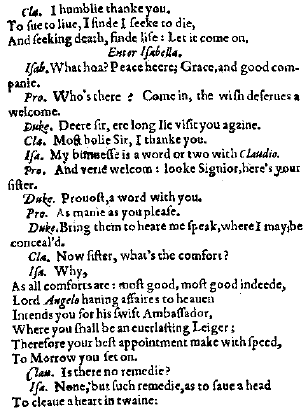|
|
CLAUDIO.
I humbly thank you.
To sue to live, I find I seek to die,
And, seeking death, find life: let it come on.
|
|
|
|
ISABELLA.
What ho? Peace here; Grace and good company.
|
|
|
|
PROVOST.
Who's there: come in, the wish deserves a welcome.
|
|
|
|
DUKE.
Dear sir ere long I'll visit you again.
|
|
|
|
CLAUDIO.
Most holy Sir I thank you.
|
|
|
|
ISABELLA.
My business is a word or two with Claudio.
|
|
|
|
PROVOST.
And very welcome: Look, Signior, here's your sister.
|
|
|
|
DUKE.
Provost, a word with you.
|
|
|
|
PROVOST.
As many as you please.
|
|
|
|
DUKE.
Bring me to hear them speak, where I may be concealed.
|
|
|
|
CLAUDIO.
Now sister, what's the comfort?
|
|
|
|
ISABELLA.
Why,
As all comforts are; most good, most good indeed.
Lord Angelo, having affairs to heaven,
Intends you for his swift Ambassador,
Where you shall be an everlasting Leiger;
Therefore your best appointment make with speed,
Tomorrow you set on.
|
|
|
|
CLAUDIO.
Is there no remedy?
|
|
|
|
ISABELLA.
None; but such remedy, as to save a head
To cleave a heart in twain.
|
|
|
 |
This scene is full of staging challenges. First, where is Claudio's prison cell and how is it configured? Do the Duke and Isabella see Claudio in a waiting room adjacent to the cell? Are the Duke and Isabella left alone on stage with Claudio, and if so, is he in chains? Does the dialogue suggest that the Provost is on stage with the Duke while he talks to Claudio? If not, when does he enter and exit? And, of course, the greatest challenge is where to put the Duke so he can overhear Claudio and Isabella. And is it necessary that the audience see the Duke secretly observing their conversation? What hints to all these questions are provided in the Folio?
|
